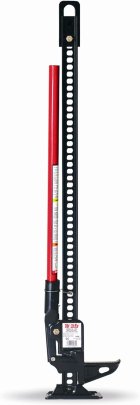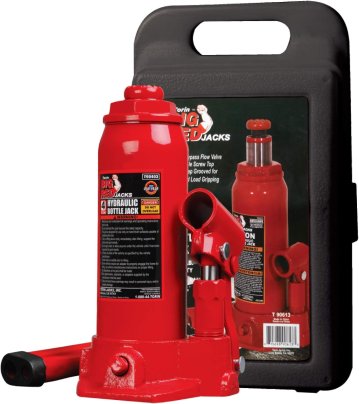We may earn revenue from the products available on this page and participate in affiliate programs. Learn more ›

Off-road driving is one of the most fun activities you can do in a vehicle, though it varies on how much mechanical sympathy you possess. Or lack, depends on how you look at it. It gets you into the great outdoors and to far-flung locations, however, it’s a tricky activity.
All fun can reach an abrupt end if you suffer a tire puncture or mechanical breakdown. These can be especially difficult repairs since off-road vehicles tend to be big and heavy and the terrain anything but accommodating. Luckily, off-road jacks make the process of swapping wheels and other trail-side repairs a bit easier. These jacks can get even the most lifted vehicles into the air, as well as offer peace of mind when it comes to safety. Let’s talk about our favorites and get you on your way.
Summary List of Off-Road Jacks
- Hi-Lift Jack HL484 48″ Hi-Lift Black Cast and Steel Jack
- Pro-Lift B-004D Grey Hydraulic Bottle Jack
- Torin T90413 Big Red Hydraulic Bottle Jack with Carrying Case
- Smittybilt 54 Trail Jack
Our Methodology
In our strenuous search for the best off-road jacks available, there were a few things we took into consideration, such as the jack’s size, load capacity, durability, ease-of-use, operation, type, maintenance, and weight. We then weighed these against price and user reviews, as well as took our own experience into consideration. We’ve done a good amount of off-roading ourselves, and while we haven’t needed to make any lengthy or complex repairs on the side of a trail, we have certainly familiarized ourselves with both bottle-type and trail-type jacks.
For more on how we select products, check this out.
Selecting the right off-road jack is a pursuit of personal taste, too. If you need something compact that you want to be thrown in the back of a smaller off-road rig, a bottle jack is hard to beat. Though, if your rig is lifted up pretty high, the bottle jack might not cut it. The key is to find something in your price range that will fit your vehicle’s size, that you’re comfortable handling, and that won’t get in the way. A cast-iron, manual trail-type jack is great, but they can be a bear to wield around and take up a lot of space.
Best Off-Road Jack Reviews & Recommendations
Best Overall
Hi-Lift Jack HL484 48" Hi-Lift Black Cast and Steel
Pros
- Slim shape can be used in tight spaces
- Works well with larger tires
- Easy to use two-piece handle and socket
Cons
- Solid base stand is sold separately
- Loose parts make it noisy while driving
- This type of jack can be tricky to use
Specs
- 49 x 5 x 10 inches
- 3.5 tons
- 28 lbs
Best Value
Pro-Lift Hydraulic Bottle Jack
Pros
- Easy to use compact size with low maintenance
- Extension screws adjust to accommodate desired work height
- Won’t over-extend
Cons
- Base is small
- Loses pressure if you leave the car on the jack overnight
- May not go as high as you need
Best Overall
Torin Big Red Hydraulic Bottle Jack
Pros
- Carrying case and compact size makes it an easy stowaway solution
- Easy to set up
- Comes with a long two-piece hand crank
- Constructed with alloyed steel
Cons
- Base isn’t very big
- Extension isn’t long enough for highly lifted vehicles
- Despite its fully welded casing, it can leak hydraulic fluid
Best Compact Manual
Smittybilt Universal Trail Jack
Pros
- Powder-coated protection
- Compact design
- Zinc-plated hardware
Cons
- Can still corrode
- Can be difficult to use
- Weight capacity is lacking
Our Verdict
Sometimes, the simple and low-tech approach is best, and that’s why we chose the Hi-Lift Jack as our best overall pick. It’s easy to use and provides plenty of lift clearance. If you want the top of the line, though, the best of the best, we recommend the Torin Big Red.
FAQs
Q: What are the different types of jacks?
A. Trail: Trail jacks, also known as farm jacks, handyman jacks, and manual jacks, are the most versatile and work on various types of road surfaces. These jacks are fairly basic and are typically designed to work in conjunction with a wide, flat base, with all applicable wheels chocked. One of the advantages of these jacks is they’re easy to use leverage in a mix of terrain, including gravel, sand, rocks, mud, and snow.
Floor: If you want a very strong hold, then a floor jack will do the trick. However, this type of jack works best on flat surfaces. While some brands have wheels and can technically be used in sand, snow, and mud, they can be difficult to move around. They are not the best choice for off-roading.
Bottle: Bottle jacks are also known as hydraulic jacks. Those with wide and grippy bases are best for off-roading. Still, bottle jacks are most efficient if they’re used on flat surfaces. They also aren’t always able to reach certain points because of their compact design.
Scissor: Scissor jacks are very simple to use but are often not ideal for off-road use since they need a flat and stable surface. While simple to use, they’re also annoying to use. It can take a long time to jack one up to the proper height on any vehicle, let alone a lifted off-roader. These are commonly found as automakers’ emergency jacks, they’re OK in a pinch and when the surface is flat, but generally any other type will be more versatile.
Q: What type of off-road jack will support my vehicle?
A. Most jacks can support a car that weighs between 1.5 and 4.0 tons. Look up the weight of your car and compare that to the weight that the jack will hold. Buying something that will support your car quite easily, such as a 4.0-ton capacity jack lifting up a 2.0-ton vehicle, is never a bad idea.
Q: What are some tips and tricks to using off-road jacks?
A. Use the jack according to its designed purpose. Trail jacks are designed primarily to get your vehicle out of a tight spot — they can be used as manual winches to some degree — or be jacked up in a tight spot.
For all jacks, never crawl underneath the vehicle unless it’s been secured with jack stands.
Try lifting your car with the off-road jack before you hit the trail to confirm that it works well. It’s important to find out about any working issues before you actually need to use the jack.
Use the jack according to the manufacturer’s instructions. Some parts may get damaged if not used correctly, compromising the safety of the device.
Q: What are some key features of off-road jacks?
A. Safety: Safety is top priority when you’re shopping for the best off-road jack. The more you can do to minimize risk, the better. Make sure that what you’re buying is designed to meet the needs of your particular situation. Look for safe jacks that come with protective features, such as shear bolts, built-in weight limits, locking-pin systems, and safety bars. Also consider buying as wide of a base as you can find, as well as wheel chocks.
Vehicle Compatibility: Not all off-road jacks work with all vehicles. Do your research and make sure the jack you purchase is designed to work with your particular rig. Check the lifting capacity and whether it can easily fit under your car, truck, or SUV. Also, make sure it’ll easily be stored inside or outside the vehicle.
Construction: The best off-road jacks are heavy-duty, sturdy, and durable. They should be constructed of high-grade steel or cast iron, so they can withstand the stress of off-road use. Most of the above highlighted high-quality jacks are powdercoated, which protects them from rust and corrosion and extends their lifespan.
Versatility: Some jacks are more versatile than others. While many brands are geared towards road use and are perfect in the garage, some can also operate in the mud, sand, or gravel. An on-/off-road jack is convenient because you can use it in a variety of situations.
Q: How much does an off-road jack weigh?
A. Jacks have different weights and sizes. For off-road use, make sure the jack is not too heavy for your physical ability, and that it will fit in tight spaces if you need to use it.
Q: Will off-road jacks fit in my trunk?
A. Off-road jacks usually do not fit in the space where your car’s original jack fits. You’ll need to do a bit of measuring before purchasing, although you can always store them in a storage box, attach them to a roof rack, or keep it in your truck’s bed.
Q: Does my off-road jack require any maintenance?
A. Be aware that many common jacks, especially of the hydraulic variety, have maintenance requirements. It’s best to consult your model’s manufacturer for the best guidance here.







